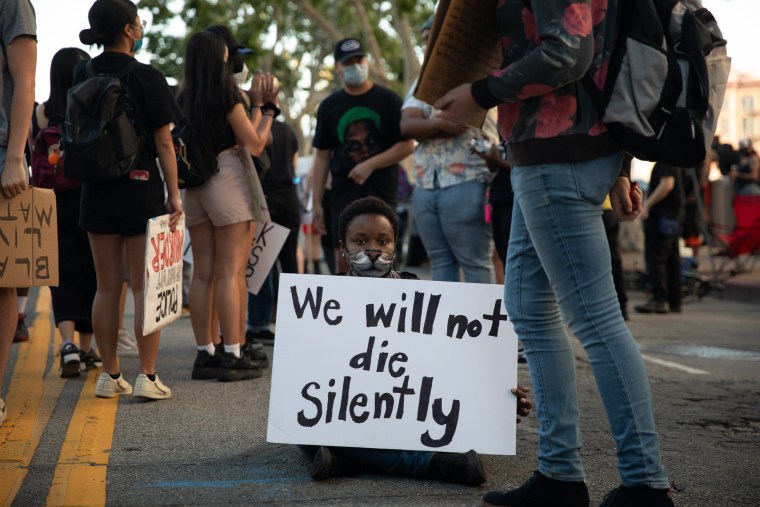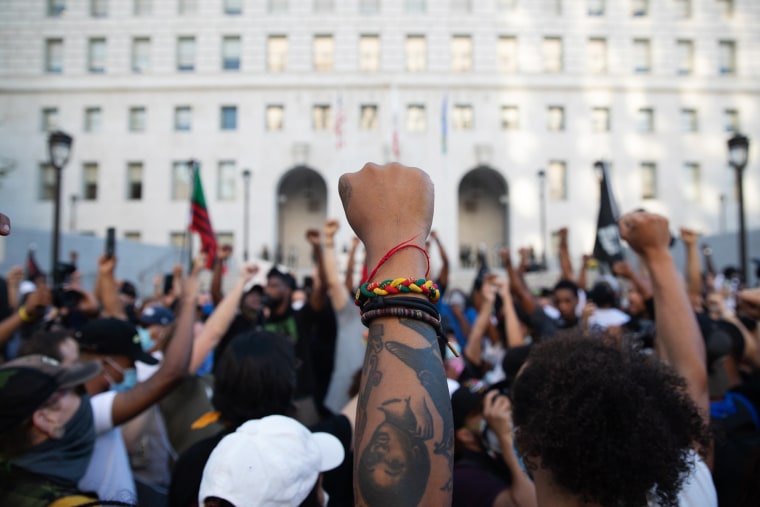LOS ANGELES — It's been nearly three years, and the protests outside Los Angeles County District Attorney Jackie Lacey's office are only getting bigger.
What started as several hundred people gathered outside the Hall of Justice has swelled into the thousands as demonstrators call for the ouster of Lacey, the first Black district attorney in the nation's most populous county, for failing to prosecute police officers who kill civilians.
"We've tried everything with her," said Melina Abdullah, co-founder of Black Lives Matter-L.A. "We had a deep desire to have things be different."
Lacey, who is seeking a third term, fell shy during a March primary of getting enough votes to avoid a runoff in November. She will face off against former San Francisco District Attorney George Gascón, a longtime Los Angeles police commander who helped reshape the department following the Rampart corruption scandal of the late 1990s.

While Gascón is regarded as the reform candidate, Lacey is seen as the law-and-order pick. She has strong support from the law enforcement community, including the union representing Los Angeles police.
"Jackie Lacey is the only candidate we feel that will keep Los Angeles County safe while successfully being able to implement meaningful reform in the court system," said Dustin DeRollo, spokesman for the Los Angeles Police Protective League. "We have serious concerns about her opponent."
DeRollo cited Lacey's reputation as a district attorney who stands up for victims of crime. But Abdullah said that consideration does not extend to victims of police brutality.
"That's the general approach to victims of police violence," she said. "When you're killed by police, you're not considered a victim."
Abdullah said she had high hopes when Lacey became district attorney in 2012. She was not only the first Black person to become the county's top prosecutor but also the first woman.
"We tried to engage her in friendly ways for two years," Abdullah said. "We thought we could move forward, but the murders kept piling up."
According to a Los Angeles Times report tracking officer-involved killings throughout the county, more than 880 people have died at the hands of law enforcement officers since 2000. In almost every case the district attorney's office found a shooting justified or decided not to bring charges, The Associated Press reported.
Lacey was raised in Crenshaw, a majority-Black neighborhood in South Los Angeles. Her mother worked in a garment factory and her father for the city's lot cleaning division.
Lacey attended law school at the University of Southern California and joined an entertainment law firm before moving to the Santa Monica city attorney's office. She joined the district attorney's office in 1986 and rose to second-in-command under Steve Cooley, who served three terms as district attorney from 2000 to 2012.
During her time in office Lacey has assembled specialty teams to handle environmental cases, sex trafficking crimes and child and elder abuse. She also created a unit that reviews claims of innocence by people convicted of felonies.
One thing she hasn't done, opponents say, is protect people who suffer abuse or die at the hands of law enforcement officers.
"Just on the assumption that she's Black and she's a woman, I assumed that she'd care about issues that impact our community the most," said Los Angeles resident LaTangia Oliver, who attended a protest outside Lacey's office this month. "It's about just the charges — not saying you'll be successful, but just bring up the charges."
Lacey first became a target for Black Lives Matter-L.A. in 2014 after the shooting death of Ezell Ford, 25, by Los Angeles police. Officials said Ford tackled an officer to the ground and reached for his gun. He was shot during the scuffle. Ford's loved ones said he suffered from a mental health disorder and was not committing a crime when he was stopped.
Ford's family settled a wrongful death lawsuit after Lacey's office declined to prosecute the officers involved because physical evidence corroborated their account that Ford posed "an immediate threat" to police.
Following Ford's death, Abdullah and other Black Lives Matter-L.A. organizers requested a meeting with Lacey. Abdullah said she left the meeting hopeful that the district attorney's office would continue looking into officer-involved shootings and that it would evaluate them fairly. But as more people died during police encounters, the relationship soured, Abdullah said.
Lacey has refused to meet with Black Live Matter-L.A. organizers over the years, Abdullah said, a claim the district attorney denies.
"Throughout my time as DA, I have always been more than willing to sit down and have an open dialogue with the Black Lives Matter Organization," Lacey said in an email. "As an African American woman, and lifelong Democrat I have consistently pursued criminal justice reform and I strongly feel that BLM can play a very meaningful role in this debate. Unfortunately, in recent times the organization has rejected my offers to have constructive conversations."
Despite her contentious relationship with organizers, Lacey has been endorsed by top lawmakers, including Sen. Dianne Feinstein, D-Calif., and several Los Angeles County supervisors.
Download the NBC News app for breaking news and politics
But many of the endorsements came in before protests erupted throughout the country after George Floyd's death in Minneapolis police custody, and support for Lacey appears to be waning. U.S. Rep. Adam Schiff, a Democrat who represents Burbank, withdrew his endorsement Saturday.
"This is a rare time in our nation's history," Schiff tweeted. "We have a responsibility to make profound changes to end systemic racism & reform criminal justice."
Los Angeles Mayor Eric Garcetti appeared to walk back his support for Lacey this month, saying in an interview that aired on NBC Los Angeles that it may be time for a change. Garcetti's father, Gil Garcetti, was a two-term district attorney.
Rep. Karen Bass, D-Calif., chairwoman of the Congressional Black Caucus and co-author of a sweeping police reform bill, said Tuesday that it's past time for police officers to be held accountable when they brutalize civilians.
"For years our communities have watched, officer after officer, no charges be brought," she said during a criminal justice reform panel with Garcetti and other mayors. "That has led to the explosion that is happening in all of our cities now."
Lacey defended her record, saying in a statement that she is "proud" of "taking on systemic racism and reforming criminal justice, from bail reform to reducing juvenile cases by nearly 50 percent to increasing our office's focus on mental health treatment instead of incarceration."
Gascón, who immigrated to Los Angeles from Cuba as a teenager, picked up an endorsement from Sen. Elizabeth Warren, D-Mass., who called him a "national leader in criminal justice reform and a powerful advocate for rethinking our approach to public safety and ending mass incarceration."
Gascón said Lacey's fractured relationship with communities of color has compromised the district attorney's office.
"When you break the social contract by looking the other way, you lose the moral authority," he said. "Then you see what you're seeing now, calls to defund the police and not wanting them in your community."
Black Lives Matter-L.A. doesn't endorse candidates, but Abdullah said recent interactions with Gascón were much more favorable than her contentious relationship with Lacey, whose husband pulled a gun on protesters in March.
It's the role of the people to hold elected officials responsible, Abdullah said. "It's not personal. It just is what it is."


